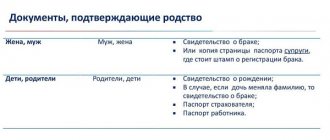Every child experiences a genuine need for family, parental love and home comfort, even if he is a “refuser” of his biological parents due to his physical inferiority by nature of birth.
For such a child to be adopted is the best scenario for his future life path.
True, it is worth noting that despite all the nobility of the act of adopting a child with a disability, future guardians may encounter a lot of difficulties in the procedure for its implementation. Therefore, I wanted to dwell in more detail on all aspects of this problem.
Dear readers! To solve your problem right now, get a free consultation
— contact the duty lawyer in the online chat on the right or call: +7 Moscow and region.
+7 St. Petersburg and region. 8 Other regions of the Russian Federation You will not need to waste your time and nerves
- an experienced lawyer will take care of all your problems!
What difficulties may arise?
Those wishing to accept such a child into their family should not forget about some negative aspects that may subsequently affect them:
- inadequate reaction of surrounding people, i.e. for the most part, everyone will probably only see the mercantile reasons of the guardians stimulating such an act of adoption;
- possible frequent nervous breakdowns of a disabled child due to communication problems in society;
- a very significant and large item of expenditure in the family budget for medical care, since the adopted baby will constantly need all kinds of treatment (paid operations, no less expensive post-operative rehabilitation periods, etc.);
- financial problems: ensuring a decent and full-fledged life for a disabled child involves significant financial costs;
- possible indifference on the part of officials of various government agencies if guardians approach them with a request for help;
- a high percentage of the likelihood of losing their favorite job, because adoptive parents will have to often take time off, extraordinary vacations due to possible health problems with the baby;
- the fear of adoption applicants associated with the enormous difficulties in obtaining a decent education for a disabled child, as well as the great difficulty of his further good employment;
- difficult relationships of a disabled child with his peers at school, in the yard, and other family members due to his distinctive physical characteristics;
- Huge problems in obtaining all kinds of rehabilitation equipment (wheelchairs, special devices and exercise equipment).
Adoption process
First of all, parents who have expressed a desire to take a disabled child into their family will need to communicate with officials from the guardianship service.
It is important to remember that this meeting is the foundation for the success of the future adoption of the baby.
Therefore, it is extremely important for the expectant mother and father to make the most positive impression on these specialists by building a tactically competent conversation.
The next stage of this complex event will be a visit to a medical institution for the purpose of undergoing a mandatory medical examination. After successfully completing the first two stages, make an application to the court, and in case of a positive court decision, contact the local registry office.
Requirements for adoptive parents
Today, there is a certain set of mandatory criteria that future parents of disabled children must meet.
The basic requirements for adoptive parents are full legal capacity, good health, and the absence of a precedent for deprivation of guardianship or parental rights.
An important requirement is also the level of material income of the future parents and the size of the available living space - naturally, these indicators should not be critical.
The age difference between the future guardian and the disabled person must be at least 16 years. Those wishing to obtain guardianship must complete special courses for foster parents.
The final verdict on the suitability of adoptive parents is issued by specialists from the guardianship service and medical workers.
Conditions for adopting a child
Prospective parents must meet the following requirements:
- permanent employment;
- sufficient wages to raise a child;
- sufficient living space for the child to live;
- no criminal record.
What does the RF IC say about adoption?
Some questions about adoption are spelled out in the Family Code of the Russian Federation. According to Article 127, only an adult citizen can adopt a child. Cannot become an adoptive parent:
- an incapacitated citizen (even if it is one of the future parents);
- a citizen who has previously lost parental rights;
- a citizen with a previous conviction;
- a citizen who was previously a guardian and was denied guardianship due to poor child support.
Can a disabled citizen apply for adoption?
According to Government Decree No. 117, disabled people of group 1 cannot adopt a child. As for disabled people of groups 2 and 3, if they do not have the diseases specified in the resolution, if they live in an apartment of suitable size, have permanent employment and an appropriate salary, they have the right to adopt a child.
Progress of the procedure
Citizens who have expressed a desire to accept a child with physical disabilities into their family need to know that the adoption of a disabled person is a difficult procedure that occurs in several stages, interdependent on each other:
- officials from the guardianship service carefully analyze the candidacies of future parents to determine their compliance with the stipulated requirements;
- after positive approval of their candidacies, future parents must collect the appropriate package of documents for the judicial procedure;
- a completed package of documents and an application for official adoption are sent to the court;
- a baby is being selected for adoption;
- trial and final decision;
- If the court decision is positive, the candidates for guardianship fill out adoption documents at the registry office.
Refusal to adopt a child
In what cases will the adoption of a child be denied?
Persons suffering from the following diseases will be denied adoption of a child (according to Government Resolution No. 117):
- mental disorders;
- tuberculosis;
- infections (adoption is possible with stable remission);
- oncology (adoption is possible in stages 1 and 2, with adequate treatment);
- disability group 1;
- any type of addiction.
Required documents
To successfully complete the entire procedure for adopting a disabled person, potential candidates will need to collect a package of the following documents:
- original and copy of the adoptive parent's passport. In a situation where the adoptive parent is already married, then the original and a copy of the spouse’s passport;
- For married people, a marriage registration certificate is required;
- a well-written autobiography of the adoptive parent(s);
- a certificate from the official place of work, which must indicate the position of the candidate for guardianship and his income for the last year. Ideally, if a copy of the income statement is also attached to the certificate;
- a document confirming that the candidate for guardianship has no criminal record for intentional crimes;
- documents that prove that the adoptive parent(s) have ownership rights to the requested housing;
- an act of compliance of the adoptive parent’s living space with the necessary sanitary indicators of living there, issued by specialists of the guardianship authorities;
- notarized consent of the spouse for future adoption;
- a certificate from a medical institution with a complete description of the health of the applicant for guardianship;
- characteristics of adoptive parents from their place of residence;
- notarized copies of existing personal accounts.
It is important to remember that all reference format documents have a certain validity period. In particular, a medical report is valid only for a three-month period after issue, and all others are valid for no more than a year.
Financial assistance, support and benefits
The state provides a one-time cash benefit to the adoptive parents of a disabled child, which amounts to 124,929 rubles. The amount of this amount increases annually through indexing. It is worth emphasizing that in a situation where two such children were adopted, the amount of the benefit is doubled.
In addition to benefits, adoptive parents have the right to count on the following benefits:
- reduction of the guardian's retirement age by 5 years, if the age of the disabled person did not exceed 8 years at the time of registration of the adoption procedure;
- discounts on utilities;
- free travel on public transport;
- monthly 4 paid additional days off, but only for one parent;
- free meals for a disabled child at school or a discount on it;
- discounted vouchers to camps, health resorts and health resorts;
- preferential government programs for lending and mortgages;
- increased ratio of preferential payments in the corresponding climate zone;
- preferential tax deduction in accordance with Article 218 of the Tax Code of the Russian Federation;
- obtaining land plots.
With these benefits, the state is trying in every possible way to stimulate citizens who have taken disabled children into their families.
Ask for help, look for like-minded people
Class at one of the Schools of Adoptive Parents.
Photo from the site arifmetika-dobra.ru It is very important that parents, even if they have many children and experience, do not think that they “already know everything.” Self-confidence is very harmful.
Adoptive parents must have a very important quality: the ability to ask for help. It's not as simple as it seems at first glance. And this is also taught at SPR.
In my opinion, the two most important ideas that parents in the SPD must convey to parents is that their path is much more responsible than anyone else’s, and the second thought is that asking for help is not shameful, not scary, but on the contrary, good and Right. These things are interconnected, because if I am ready to ask for help, it means that I approach this issue very responsibly.
Adoptive parents need help at any stage. Therefore, in addition to SPR, support services for families who have adopted a foster child are now actively working. There are different spectrums in their work - if we are talking about a child with disabilities, then the institution where the parents took the baby (or, at the request of the parents, any other institution authorized to support) can provide comprehensive services: medical, psychological, and pedagogical - both for children and adults completely free of charge.
It is very important for parents to find “their” specialist at each stage and build a trusting relationship with him. And not on a territorial basis. It is very important.
Because one family, without support, no matter how smart and kind people are, in my opinion, cannot cope with such a multifaceted task as adopting a disabled foster child.
Self-delusion here is almost equal to failure. A person who takes such a risk as accepting a sick, non-blood child into his life must, first of all, have a good understanding of himself, understand what he is doing, why, for what purpose?
There is a very deep question: is every mother ready for motherhood, is every parent strong enough to raise a “special child”. Here you need to be able to be honest with yourself.
No outside examples, heroic deeds of mothers who took 2-3-5 children should be decisive in your choice.
Only you yourself, only your specific strengths, your desire, your abilities - taking into account the fact that you are ready to ask for help, and not do everything “yourself”.
And there is no general recipe: everyone has their own time frame for making a decision, awareness, and preparation. Deadlines are a very arbitrary thing.
When a foster parent receives a referral to visit a child they are considering adopting, according to our laws, they have 10 days to refuse or consent.
Of course, the decree also provides for those cases when the future family needs more time to get to know each other. In this case, the family signs a consent form and continues to visit the baby in the institution until both parties are ready to start their new life together.
Sometimes, although extremely rarely, it happens that parents and a child understand in one meeting that this is “the one.” And others, of course, need much more time to understand themselves and not make mistakes.
Adoption of HIV-infected children
A special place in the discussion of adoption of disabled children is occupied by the topic of adoption of a child diagnosed with HIV.
According to the law, HIV-infected children have the same legal status as children of other disability groups.
It is worth noting, however, that just 10 years ago there were much fewer people willing to adopt a child with this diagnosis than a child with any other type of disability.
This phenomenon occurs due to an incorrect stereotype of perception of the disease. Medical scientists have already proven that children with a positive HIV indicator are able to live a full, long and happy life, give birth to healthy children, and engage in almost any type of professional activity, of course, provided that they adhere to constant therapy for their incurable illness.
For a child diagnosed with HIV, the law provides for free treatment and regular distribution of drugs with special therapeutic effects in regional prevention centers.
Payments
Although the law does not prohibit the adoption of children with disabilities (except for group 1), there are no incentives either. There are no additional payments to adoptive parents with restrictions, only standard ones. So, what payments are due if a child is adopted by a disabled person, or if he himself is a person with disabilities?
Disabled adoptive parent
Regardless of the health status of the adoptive parent, several types of payments are required when adopting a child.
- A one-time allowance for an adopted child, without reference to his age, is 14,497 rubles.
- When adopting a newborn (up to 70 days from the date of birth), a one-time monthly average salary is paid, but a maximum of 52,000 rubles.
- Monthly care allowance for up to one and a half years (if adopting a newborn) - 40% of the average monthly earnings for the last 12 months.
- When adopting the second, third and subsequent children - maternity capital, regardless of the gender of the adoptive parent.
Kid with disabilities
But if the adopted child has serious health problems, the state is a little more generous.
- One-time payment – 110,775 rubles.
- Monthly care payment if the adoptive parent is not officially employed – 5,500 rubles.
Authorities in the regions are also trying to help financially people who have adopted sick people; the specific amounts depend on the place of residence. In addition, the child will receive a pension, but this money will not make any difference.







